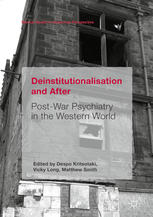

Most ebook files are in PDF format, so you can easily read them using various software such as Foxit Reader or directly on the Google Chrome browser.
Some ebook files are released by publishers in other formats such as .awz, .mobi, .epub, .fb2, etc. You may need to install specific software to read these formats on mobile/PC, such as Calibre.
Please read the tutorial at this link: https://ebookbell.com/faq
We offer FREE conversion to the popular formats you request; however, this may take some time. Therefore, right after payment, please email us, and we will try to provide the service as quickly as possible.
For some exceptional file formats or broken links (if any), please refrain from opening any disputes. Instead, email us first, and we will try to assist within a maximum of 6 hours.
EbookBell Team

0.0
0 reviewsThe book relates the history of post-war psychiatry, focusing on deinstitutionalisation, namely the shift from asylum to community in the second part of the twentieth century.
After the Second World War, psychiatry and mental health care were reshaped by deinstitutionalisation. But what exactly was involved in this process? What were the origins of deinstitutionalisation and what did it mean to those who experienced it? What were the ramifications, both positive and negative, of such a fundamental shift in psychiatric care? Post-War Psychiatry in the Western World: Deinstitutionalisation and After seeks to answer these questions by exploring this momentous change in mental health care from 1945 to the present in a wide range of geographical settings. The book articulates a nuanced account of the history of deinstitutionalisation, highlighting the constraints and inconsistencies inherent in treating the mentally ill outside of the asylum, while seeking to inform current debates about how to help the most vulnerable members of society.